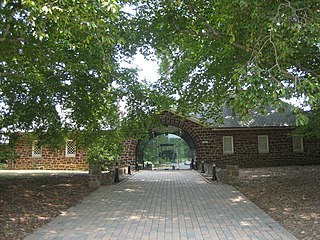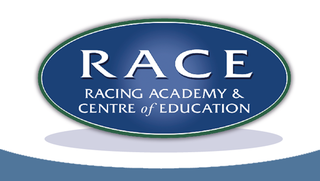Related Research Articles
A nonprofit organization (NPO), also known as a non-business entity, not-for-profit organization, or nonprofit institution, is a legal entity organized and operated for a collective, public or social benefit, in contrast with an entity that operates as a business aiming to generate a profit for its owners. A nonprofit is subject to the non-distribution constraint: any revenues that exceed expenses must be committed to the organization's purpose, not taken by private parties. An array of organizations are nonprofit, including some political organizations, schools, business associations, churches, social clubs, and consumer cooperatives. Nonprofit entities may seek approval from governments to be tax-exempt, and some may also qualify to receive tax-deductible contributions, but an entity may incorporate as a nonprofit entity without securing tax-exempt status.
The Virginia–Maryland College of Veterinary Medicine is a state-supported college of two states, Virginia and Maryland, filling the need for veterinary medicine education in both states. Students from both states are considered "in-state" students for admissions purposes.
A general counsel, chief counsel, or chief legal officer (CLO) is the chief lawyer of a legal department, usually in a company or a governmental department.
Practical Horseman is an American equestrian magazine that focuses on English-style riding, most notably hunter/jumpers as well as dressage and eventing.
Professional Association of Therapeutic Horsemanship International, formerly the North American Riding for the Handicapped Association (NARHA), is a non-profit organization based in Denver, Colorado, that promotes the benefits of therapeutic horseback riding and other equine-assisted activities and therapies for people with physical, emotional and learning disabilities. PATH Intl. serves people of all ages, backgrounds and walks of life. They serve people with both physical challenges as well as those with mental challenges. Some examples of challenges participants face are multiple sclerosis, down syndrome, post traumatic stress disorder, autism and traumatic brain injuries. PATH Intl. is a 501(c)(3) organization.
Arts administration is a field in the arts sector that facilitates programming within cultural organizations. Arts administrators are responsible for facilitating the day-to-day operations of the organization as well as the long term goals by and fulfilling its vision, mission and mandate. Arts management became present in the arts and culture sector in the 1960s. Organizations include professional non-profit entities. For examples theaters, museums, symphonies, jazz organizations, opera houses, ballet companies and many smaller professional and non-professional for-profit arts-related organizations. The duties of an arts administrator can include staff management, marketing, budget management, public relations, fundraising, program development evaluation, and board relations.

The Belair Stable Museum is located at 2835 Belair Drive in Bowie, Maryland. It is operated by the City of Bowie, Maryland. The building once housed the Belair Stud Farm until 1957 when the Woodward family sold the Belair Estate to Levitt & Sons for the construction of Belair at Bowie.

Equine-assisted therapy (EAT) encompasses a range of treatments that involve activities with horses and other equines to promote human physical and mental health. The use of EAT has roots in antiquity, and EAT applies to physical health issues in modern form dates to the 1960s. Modern use of horses for mental health treatment dates to the 1990s. Systematic review of studies of EAT as applied to physical health date only to about 2007, and a lack of common terminology and standardization has caused problems with meta-analysis. Due to a lack of high-quality studies assessing the efficacy of equine-assisted therapies for mental health treatment, concerns have been raised that these therapies should not replace or divert resources from other evidence-based mental health therapies.

The British Horseracing Authority, also known simply as the BHA, is the regulatory authority for horse racing in Great Britain.
An equestrian facility is created and maintained for the purpose of accommodating, training or competing equids, especially horses. Based on their use, they may be known as a barn, stables, or riding hall and may include commercial operations described by terms such as a boarding stable, livery yard, or livery stable. Larger facilities may be called equestrian centers and co-located with complementary services such as a riding school, farriers, vets, tack shops, or equipment repair.
The Oklahoma State Department of Health (OSDH) is a department of the government of Oklahoma under the supervision of the Oklahoma Secretary of Health. The department is responsible for protecting the health of all Oklahomans and providing other essential human services. The OSDH serves as the primary public health protection agency in the state.

The Australian Equine and Livestock Events Centre (AELEC) is a multi building and arena complex that was designed for equine usage. It has two indoor arenas, stabling, plus an education and training building, which is located on the New England Highway approximately five kilometres south of the Tamworth Central Business District in the suburb of Hillvue.
The Maryland Department of Commerce is a government agency in the state of Maryland in the United States. Although its was originally founded in 1884, the department came to be recognized as the Department of Commerce in 2015.

The executive branch of the government of Puerto Rico is responsible for executing the laws of Puerto Rico, as well as causing them to be executed. Article IV of the Constitution of Puerto Rico vests the executive power on the Governor—whom by its nature forms the executive branch.
Diane Crump is an American jockey and horse trainer. Crump was the first woman to ride in a pari-mutuel race in the United States; her participation in the event was so contested that she required a full police escort through the crowds at the Hialeah Park Race Track. She went on to be the first woman to ride in the Kentucky Derby. Crump briefly retired 1985 to become a horse trainer, but returned to riding and was a professional jockey until retiring in 1999. She now runs an equine sales business.
Sally Haydon was an American professor of equine science and a trainer of American Saddlebred horses and riders. She was Chair of the Equine Studies department at Midway College in Midway, Kentucky, president and founder of the Intercollegiate Saddle Seat Riding Association (ISSRA), and the Owner/Director of Educational Programs at the Bluegrass Riding Academy. Haydon worked several years teaching saddle seat equitation with renowned trainer and author Helen Crabtree, and she was also a former board member of The Cleveland Home.

The Racing Academy and Centre of Education (RACE) is a jockey training school at the Irish National Stud near Kildare, Ireland. Its Trainee Jockey Course is a foundation course in race riding and stable work, taught in a 42-week residential program. Students typically go on to either jockey apprenticeships or stable work after completing the course. Johnny Murtagh and Cathy Gannon are among those who have gone on to success as racing jockeys after taking the Trainee Jockey Course. RACE also offers other training and certification in race riding, the care of horses and racehorse training, including riding courses for international students. The Irish School of Farriery run by the Irish Farriery Authority is located in a purpose-built building on the RACE campus, and several other organisations involved in the equine sector are also located here.

Wolkentanz, also known as Wolkentanz I, was a champion Hanoverian stallion who stood at stud at the Celle State Stud in Germany. He was noted as a leading sire of dressage horses.

The equine industry in Kentucky is a major part of the state's agribusiness, including sectors involved in horse breeding and rearing, racing, buying and selling, and tourism. According to a study by the University of Kentucky, the equine industry contributed $3 billion to the state economy in 2012 and generated 40,665 jobs. Some job estimates range as high as 96,000 when considering secondary impacts such as tourism. Kentucky is the United States' leading producer of horses overall, and the number one producer of Thoroughbreds, with 30% of the national foaling total. In 2009, stud fees and horse sales totaled $4.26 billion, making horses the state's second most profitable agricultural product. Purebred horses exported from Kentucky were worth between approximately 150 and 175 million dollars each year from 2012 to 2015.
References
- ↑ "Maryland Horse Industry Board Issues Grant to Equine Medical Center". TheHorse.com. November 12, 2003. p. Article 4816.
- DeFord, Susan (January 16, 2003). "Hitching a Farm's Future to Horses; Maple Spring Rides a Growing Interest Statewide in Equine Enterprises". The Washington Post. Retrieved 2008-05-09.[ dead link ]
- "MD Horse Industry Board collecting $2 per ton assessment on equine feed". Daily Record, The (Baltimore, MD). November 5, 2002. Retrieved 2008-05-09.
- Maryland Department of Agriculture: Fact Sheet on Maryland Horse Industry Board